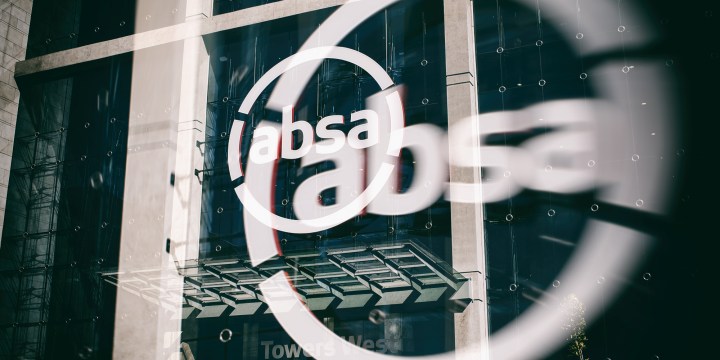BUSINESS MAVERICK
Absa highlights South Africa’s ‘fragile’ economic recovery despite posting solid interim results

Banking group reaps the rewards of a strategy implemented under former CEO Maria Ramos, reinstates dividends and says little about the appointment of a new CEO.
‘Fragile’ is the word used by Absa’s acting CEO, Jason Quinn, to describe South Africa’s economic recovery in the first half of this year. While the economic recovery, supported by lower interest rates, was better than expected in the first half, the risks remain outsized, and consumer and business confidence remain weak at best.
“The socioeconomic impact of the prolonged nature of the pandemic and the associated fatigue is becoming evident,” Quinn told investors and media at the presentation of the group’s interim results to 30 June. Load shedding remains a downside risk to growth for the rest of this year, while the recent unrest poses a risk to GDP growth in the third quarter, by reducing economic activity in two of the largest provinces.
During the unrest, 22 of Absa’s branches and 233 ATMs were damaged, while 2,500 point-of-sale devices were damaged or stolen. Of Absa’s corporate and commercial clients, more than 400 were affected, either directly or via supply chain, production or trading interruptions. Retailers and commercial property clients were most affected, he said.
“The unrest will have a substantial negative impact on already fragile consumer and business confidence, which could dampen investment in infrastructure and inventory rebuilding. It may also increase South Africa’s credit risk and deter foreign investors, although it is hard to quantify this.”
Within this context, Absa reported earnings that have not only returned to pre-Covid-19 levels but in some cases are above these levels, a not inconsequential achievement given the distractions of the Barclays unbundling and the multiple revolutions of the CEO’s door.
“Our first-half performance was better than expected,” says Quinn. “It is particularly pleasing that our earnings are above pre-Covid-19 levels. Also, our first-half normalised headline earnings per share is our highest ever, 4% above the previous record in the first half of 2019.”
Absa grew normalised headline earnings fivefold to R8.6-billion. This was on the back of growth in its retail and business banking division, which grew headline earnings by a hefty 811% to R4.1-billion, largely thanks to growth in retail loans; and corporate and investment banking where headline earnings more than doubled to R4-billion, driven by growth in the global markets business and the investment bank.
This helped to offset the low credit appetite from corporate clients.
“A 1% pre-provision profit growth is a good result in this environment,” says Nolwandle Mthombeni, senior banking analyst with Intellidex, “particularly given that the stronger rand has dampened results from the Africa business.”
However, reporting at her first results presentation, Punki Modise, Absa’s group interim financial director, was quick to point out that the significant growth in earnings was supported by lower credit impairments. “Credit impairments fell by two-thirds or R10-billion, as our credit loss ratio normalised after last year’s substantial charge,” she said.
Absa recorded impairment charges of R4.7-billion, compared with R14.7-billion in the first half of 2020.
South African consumers are making the most of the lower interest rate environment, and Absa is benefiting. Its home loan book grew by 8%, with the rate of new mortgages registered double that of 2020. At the same time, vehicle and asset finance increased 14%, partly because Absa’s share of new vehicle financing rose to 29% from 25%. Credit cards issued rose 6% but personal loans declined 9%, given the bank’s tighter risk appetite over the period.
This led to net interest income increasing by 6% from the prior-year base which included the impact of significant policy rate cuts and was supported by strong growth in core deposits. Deposit growth grew by 12%, outstripping loans and improving Absa’s funding mix.
Non-interest income declined by 2% on the previous year, adversely affected by the insurance business and low growth in fee income.
The results are noisy, with many one-off items including provisions and higher-than-expected life and unemployment claims in the insurance business. The takeaway in the results, says Mthombeni, is that Absa is growing market share and is a stronger business for it. “Absa is likely to be the only bank to report earnings higher than the pre-Covid period, and that is a huge feat.”
The group has strengthened its capital position with the CET 12 ratio improving to 12.4% supported by the strong earnings generated in the first half. It is now at the upper end of the board target level and comfortably above the minimum regulatory capital requirement level.
This allowed Absa to reinstate dividends, with it announcing a dividend of 310c, based on a dividend payout ratio of 30% for 2021, increasing to 50% over the medium term. “This was not unexpected, given that management had guided for this ratio, but it seems unnecessarily low,” says Mthombeni. “Management has wanted to increase capital levels, but these are now comfortably within the range. Why keep the payout ratio so low – and over the medium term?”
Certainly, Absa is reaping the rewards of a strategy implemented in 2018, raising the question of why management is being so cautious.
“We are now confident, in hindsight, and considering the improvements in our financial momentum, that most of the key strategic calls made in 2018 were good decisions, which we have been delivering against and which remain very relevant today,” Quinn said. “It’s also clear that much opportunity still remains.”
Quinn, as acting CEO, was not in a position to provide much colour on the process under way to find a new CEO, following the resignation of Daniel Mminele in April, and his elevation from CFO into the hot seat, albeit on an acting basis. “The board is busy with it,” he said. BM/DM



















 Become an Insider
Become an Insider
Comments - Please login in order to comment.